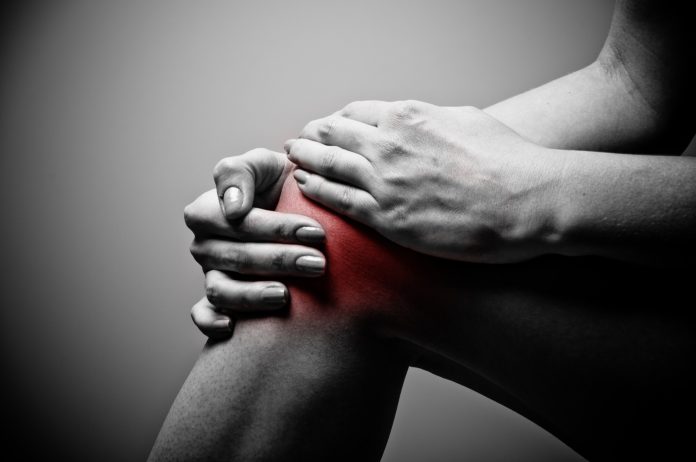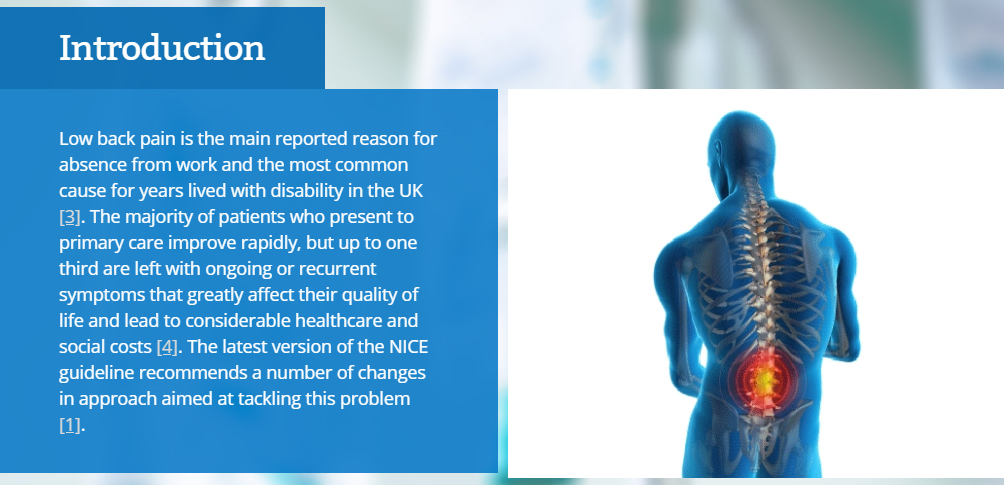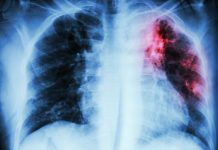e-Learning for Healthcare introduces the online programme of learning called e-Pain, and how it can directly benefit the NHS workforce, the wider NHS and its patients
Pain touches everyone. Pain is a universal human experience and one of the most common reasons to seek medical advice. Pain is more than just suffering, it can impact on individuals and affect their day-to-day physical activity, emotional wellbeing and sometimes that of their family. Pain can affect any individual’s ability to work and, as a consequence, impact on both their community and society as a whole.
Healthcare professionals understand the impact poorly managed pain can have and how it affects their patients.
Health Education England has partnered with the Faculty of Pain Medicine, the British Pain Society and e-Learning for Healthcare to create an online programme of learning called e-PAIN. e-PAIN is a collection of hundreds of digital resources, including e-learning content, journal articles and assessments, which are all available free of charge to the healthcare workforce in the UK.
While aimed at the NHS workforce, pain is international, so the e-learning programme is based upon the International Association for the Study of Pain’s (1) recommended curriculum for healthcare professionals. The curriculum is multidisciplinary, so e-PAIN is the ideal place to start for anyone working in the NHS who wishes to better understand and manage pain. It is relevant to doctors, nurses, psychologists, physiotherapists, GPs and any members of the health and care workforce who deal with patients suffering from acute or chronic pain.
The Editorial Team
The content is created by healthcare professionals for healthcare professionals. The Editorial Team and the session authors are sourced from the Faculty of Pain Medicine (2) and the British Pain Society, (3) and is multi-professional, reflecting the diverse audience that accesses the e-PAIN programme.
The Content
e-PAIN uniquely distils the knowledge of clinical experts into 12 modules:
Introducing pain management
Acute pain
Pain as a long-term condition
Pain conditions around the body
Musculoskeletal
Neuropathic pain
Pain in children
Pain in older people
Special populations
Cancer pain
Basic science
These modules are made up of interactive sessions to meet the needs of a multidisciplinary audience and improve their knowledge, skills and attitudes when dealing with patients presenting with pain.
The sessions deliver knowledge ranging from how to manage acute pain well, through to in-depth learning about common pain conditions and moves on to cover how to manage pain in specialist areas, like pain in cancer or pain in childhood. There is also extensive coverage of effective prescribing, for example, of drugs such as opioids, demonstrating how e-PAIN can have direct benefit for the wider NHS and its patients.
Specific issues addressed by the programme’s 30-minute sessions include:
Improving the recognition of unrelieved acute and chronic pain in all patients’ groups.
Appropriate assessment of pain.
First-class management of pain.
Ensuring good clinical practice.
Most of the material is written by the e-PAIN Editorial Team and related authors but it also contains other materials curated from trusted sources, such as the British Journal of Anaesthesia (4) and the Royal College of Anaesthetists.(5) These other resources are in varied formats, including videos which are all available from the e-PAIN programme.
The bespoke content is reviewed on an ongoing basis to ensure information remains up-to-date and impactful, reflecting current best practice and based on the most recent evidence.
The e-PAIN programme will be expanded in the coming year to include learning objectives for those at the start of their clinical careers by mapping the content to medical school outcomes and the Foundation curriculum, with support from the Medical Schools Council and the national Foundation Directors.
Why e-Learning?
The benefits of an e-learning approach are plentiful. The content is available 24 hours a day, 7 days a week and users can access it from anywhere. Particularly in current circumstances where the Coronavirus outbreak means any unnecessary travel is restricted, self-study from home is vital for healthcare professionals who need to upskill in response to the pandemic.
Also, the knowledge and experience of the most respected clinicians are made available to all users in all settings, whether in the Highlands of Scotland or the tip of Cornwall. Everyone can benefit, regardless of location.
The standardised approach, backed by the Faculty of Pain Medicine and British Pain Society and aligned to the International Association for the Study of Pain’s curriculum, means that users know that the content is trustworthy and reflects the clinical practice of today.
A success story
Since its launch, many thousands of users have benefited from the high-quality learning available in e-PAIN. Its users have launched over 200,000 pieces of content, each one a valuable training intervention helping to upskill the workforce to benefit patients suffering pain.
However, a high number of interventions has no value if users think that the interventions themselves are not useful. Thankfully, e-PAIN is highly rated by its users. The average feedback score is 4.3 stars out of 5, indicating that users find the materials are engaging, relevant and informative.
Summary
As the country at large adapts to the change in lifestyle brought about by the Coronavirus pandemic, we are all turning to alternative ways of communicating with each other and carrying on our lives. Traditional face-to-face training events are now being run on Zoom, and we are all turning to the Internet. e-PAIN is ahead of the curve and is already fully online and ready to access for the whole of the NHS workforce.
For more information about the e-learning programme, including details on how to access, visit: www.e-lfh.org.uk/programmes/pain-management
References
https://www.britishpainsociety.org/
e-Learning for Healthcare
Twitter: @HEE_TEL
Please note: This is a commercial profile












